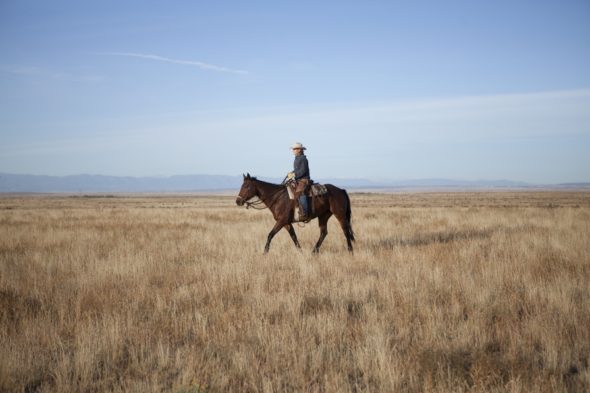Do you already know exactly how you want to spend your days, but you can't admit it because it seems invalid? Like, how could someone possibly make a career out of 'just' fill-in-the-blank? Amy's story reminds us how easy it is to ignore the voice inside us that knows exactly where we should be spending our time and energy. What would happen if you listened to yours?
To learn more about the Quivira Coalition's New Agrarian Program, visit our education page at goodfoodjobs.com/education.
When did you know that you wanted to work in food?
I had worked on a variety of ranches throughout high school and college. After graduating from college, I worked in an office environment for a couple years, but found myself missing the outdoors, and doing something tangible with my hands. I had always wanted to travel and I wanted to work in agriculture, so I decided to travel to Australia and find work on a cattle station. During this experience, I was introduced to many sustainable methods of ranching and living off the land. I found myself returning the U.S. rethinking the progressive opportunities agriculture and food may provide to people, and I wanted to be a part of it.
How did you get your current good food job?
Networking. I met my current manager at a branding where neighbors had come together to help with the day's work. I stayed in touch and ended up working for him through an apprenticeship program. Upon completion of the apprenticeship, he happened to have a management position come up on a ranch he just got a lease on, and that is where I am today - everything just fell in place.
How did your previous work or life experience prepare you for a good food job?
I think one of the most influential experiences I had was completing an apprenticeship at the San Juan Ranch with the Quivira Coalition. During this time, my mentors really helped me to learn how to learn. I developed the skills I needed to confront situations where I didn't have the experience to know how to handle them. But knowing how to use my resources and gather information allowed me to feel comfortable in these situations, and eventually figure them out.
What was the greatest obstacle you had to overcome in pursuing your Good Food Job dream?
I think my greatest obstacle was realizing I could make a professional career in ranching. I had always loved it and I think I had always known it was what I wanted to do, but we I grew up in a culture that valued a "professional career" more than one tied to the land. I never felt like it was OK for me to "just ranch." I tried a lot of different jobs, but found myself always returning to agriculture. Once I overcame this paradigm, I never looked back.
Name one positive thing that a former employer taught you that you continue to appreciate?
While I was working at a dairy farm, my manager always said, "You take care of the small things and the big stuff takes care of itself." This is so true, and I always think of it when I get really busy. If you are diligent in the moment, it saves a lot of time down the road.
What can you identify as the greatest opportunities in food right now?
I think one of the most exciting aspects of the food movement is that it is creating a paradigm shift - changing the way society views agriculture from something to get away from to a career that can be rewarding, viable and respectable. This, in turn, is creating more opportunities for young people to get out there and do it. The more people we can get on the ground, the more of a difference we can make to strive for healthy soil, productive land, and good food.
If you could be compensated for your work with something other than money, what would it be?
More time!









